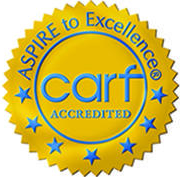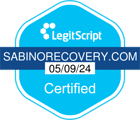Cognitive Behavioral Therapy for Addiction & Mental Health
At Sabino Recovery, an upscale addiction treatment center, you will experience a top-notch cognitive behavioral therapy (CBT) program designed to address addiction and mental health disorders, along with their underlying causes. Focused on a trauma-centered approach, our integrative program combines naturopathic and allopathic medicine with evidence-based modalities, which foster holistic healing.
Our CBT program at Sabino Recovery enables you to recover from alcohol or drug abuse by helping you heal from underlying trauma. This tailored approach ensures long-lasting mental health improvements and significantly reduces the risk of relapse.
Experience the transformative power of the best CBT program for addiction and mental health, and embark on your path to true recovery. Contact Sabino Recovery today and take the crucial first step toward a healthier, addiction-free life.

Is Addiction Impacting Your Life?
Take The First Step To True Healing Today!
What is Cognitive Behavioral Therapy (CBT)?
Cognitive behavioral therapy (CBT) is an evidence-based psychological treatment approach that helps you identify and challenge unhelpful thought patterns and behaviors. As a result, you can develop healthier habits and coping mechanisms.
Two essential components of CBT are:
- Cognitive therapy: focuses on recognizing and changing negative thinking patterns.
- Behavioral therapies: emphasizes correcting and replacing maladaptive behaviors with more adaptive ones.
In behavioral health treatment, cognitive behavioral interventions are highly effective as they target the root causes of your substance abuse, such as emotional triggers or situational influences. By tackling these issues, CBT empowers you to better manage your cravings and reduce the risk of relapse in the long run.
How Does CBT Work?
This type of behavioral therapy is a proven and influential approach to treating substance use disorders. It also effectively treats mental disorders, including anxiety disorders, bipolar disorder, and other mood disorders. CBT is led by trained cognitive behavioral therapists and roughly follows this process.
Assessment
The first step in the CBT process is assessment, where a thorough understanding of your mental health conditions and the factors contributing to them is developed. Your therapist will gather information about your thoughts, feelings, and behaviors related to your psychological disorder. This process will help develop the best treatment strategies for your condition.
Identification of Negative Patterns
Once the assessment has been carried out, your therapist will help you identify the negative thought patterns and cognitive distortions that may be contributing to your mental illness. These patterns can include irrational beliefs, distorted perceptions of reality, and self-defeating thoughts. By recognizing and understanding these negative patterns, you can begin to work on changing them to improve your mental health.
Goal Setting
In CBT, goal setting is an important part of the treatment strategy. Together with your therapist, you will establish realistic, achievable goals for improving your mental health and addiction and preventing relapse. These goals may focus on behavioral strategies to reduce symptoms, improve coping skills, and enhance overall well-being.
Skill Development
Developing effective skills is essential for managing and overcoming psychological disorders. In this phase of CBT, you will learn techniques for managing negative thoughts, feelings, and behaviors related to your specific mental health condition. Some common skills taught include:
- Problem-solving strategies
- Relaxation techniques
- Communication and assertiveness training
- Cognitive restructuring, to challenge and modify negative thoughts
By mastering these skills, you become better equipped to handle challenging situations and maintain a healthier mental state.
Behavioral Experiments
Once you have learned new coping skills, it’s important to test them in real-life situations. Behavioral experiments involve creating a hypothesis about how a new skill or way of thinking will influence a specific situation and then trying it out. This process allows you to evaluate the effectiveness of your new skills and make adjustments as necessary.
Overall, CBT works by assessing your mental health condition, identifying negative thought patterns, setting goals, developing skills to cope with your disorder, and conducting behavioral experiments to evaluate the effectiveness of the new strategies. With consistent practice and guidance, CBT can significantly contribute to the treatment and management of various mental health disorders.
Contact Our Admissions Team Today
Benefits of CBT for Addiction and Mental Health Disorders
- Develop coping skills that help you face situations that previously triggered drug use, alcohol use, or mental health symptoms. This is an effective relapse prevention method and provides you the tools to effectively handle cravings or challenging emotions.
- Improve problem-solving and decision-making abilities, leading to better control over your thoughts and behaviors.
- Learn how to manage negative emotions, such as stress or anger, ultimately minimizing the inclination to resort to your substance abuse as a coping mechanism.
- Replace harmful beliefs and thought patterns surrounding your mental health or substance use disorder with healthier, more constructive perspectives. This fosters a positive mindset and promotes long-term recovery.
- Enhance self-esteem and confidence by celebrating progress and personal achievements in overcoming addiction and mental health challenges.
Applying CBT techniques empowers you to make significant changes in your life that contribute to lasting recovery from behavioral health issues. By harnessing these benefits, you can regain control of your life and build a healthier, more fulfilling future.

Testimonials
![]()
![]()
![]()
![]()
![]()
Regina
I am so happy that I chose Sabino to begin my recovery. I have suffered for years from depression, anxiety, panic disorder, and PTSD. The programs that are offered here at Sabino have been truly phenomenal in helping me recover. I also appreciated the professional staff that are here on duty 24/7, which helps create a safe environment. Sabino Recovery uses effective “one on one” methods that meet each person’s individual needs because they evaluate and have a better understanding of your personal traumatic experiences. Thanks Sabino, I am truly grateful to you and the Sabino family.
![]()
![]()
![]()
![]()
![]()
J.A.
A beautiful facility! Staff sets the tone and kindness that residents easily follow. Thank you, Sabino Recovery!
![]()
![]()
![]()
![]()
![]()
Pamela
The program at Sabino Recovery works! I emerged from an accumulation of unrecognized emotions, issues of trust, and unresolved grief and loss. 35-days of effective integration of customized quality therapy reconnected my mind, body, spirit, and I am worth it! I had masked emotions and hurtful events for decades with alcohol. At Sabino Recovery I safely focused deep within to unleash harmful secrets and self-degradation. Tools of recovery were practiced, not just presented. Integrative therapies were tailored to my circumstances, thus were effective. This residential program is like no other. For me, Sabino Recovery delivered what was professed. I am forever grateful for this gift of healing.
![]()
![]()
![]()
![]()
![]()
Mike
Life changing experience. Wonderful staff. Wonderful program. Thanks for everything!
![]()
![]()
![]()
![]()
![]()
Darcy
It was great to begin my recovery in a group environment with so many knowledgeable nurses, therapists, BHT’s, and others around for support. The equine therapy, challenge course, family week, and daily therapies all work together seamlessly, allowing me to leave Sabino as a healthier and stronger person!
CBT Techniques For Substance Abuse And Mental health Treatment in Tucson, AZ
Cognitive behavioral therapy techniques used in addiction and mental health treatment aim to help you identify and change negative patterns of thinking and behavior that contribute to substance misuse.
One technique is identifying and challenging irrational beliefs. It enables you to recognize your distorted thoughts and replace them with healthier, more balanced ones. This process requires self-reflection and honesty to effectively improve your well-being.
Another technique is coping skills training, which focuses on developing healthier ways to deal with stress and cravings. These can include relaxation exercises, mindfulness, and problem-solving strategies. By learning new coping mechanisms, you can better manage your emotions and reduce the likelihood of relapse or reduce the impact of your mental health disorder on your daily life. In cognitive behavioral therapy for addiction and mental health, you’ll often participate in group sessions to practice social and communication skills. These sessions promote accountability and peer support, which can be crucial for maintaining progress and recovery.
In cognitive behavioral therapy for addiction and mental health, you’ll often participate in group sessions to practice social and communication skills. These sessions promote accountability and peer support, which can be crucial for maintaining progress and recovery.

How CBT Helps Individuals Overcome Addiction and Mental Health Challenges
In addressing substance dependence, CBT recognizes that addiction is a learned behavior. It helps you identify and change the triggering situations and thoughts leading to substance use. CBT equips you with healthy coping mechanisms and alternative ways to respond to cravings or stress.
In addressing mental health disorders, CBT also acknowledges that these conditions often involve learned behavior patterns. It helps you discover and change the triggering situations and thoughts leading to your symptoms.
Dysfunctional beliefs about oneself and the world drive maladaptive behavioral patterns. CBT therapists work with you to challenge and reframe these beliefs. For example, you may need to address overgeneralized thoughts such as “I can’t function without alcohol” or “I’m not creative if I don’t use drugs.”
Through CBT, you gradually learn to modify your thought patterns and break the cycle of addiction. This, in turn, enables you to build self-efficacy and maintain long-term abstinence from drug and alcohol use.
Nationally Recognized & Accredited




Cognitive Behavioral Therapy at Sabino Recovery
At Sabino Recovery, an in-depth assessment is completed upon admission. This information provides the treatment team with the needed information to create a personalized mental health or addiction treatment plan tailored to your specific needs. As a dual-diagnosis treatment center, Sabino Recovery specializes in treating both addiction and mental health disorders by focusing on your underlying trauma and employing evidence-based approaches like CBT for addiction.
During your journey, you have access to a comprehensive care plan that addresses all aspects of your well-being. With 50 individual therapy sessions in 35 days, you receive ample one-on-one support. Group therapy, which never exceeds eight participants, fosters an intimate and supportive environment. Moreover, our robust family program offers on-campus, in-person sessions, with a dedicated family therapist to involve your loved ones in the healing process.
To ensure long-lasting success, continuing care planning begins shortly after admission. This may encompass continuing treatment through medication management, individual therapy, partial hospitalization programs, or intensive outpatient programs. As part of Sabino Recovery’s lifelong alumni program, you can benefit from individualized follow-up, weekly structured group Zoom calls, and alumni reunions, all offered free of charge.
Heal from Your Substance Abuse Through Our CBT Program at Sabino Recovery
Facing addiction can be overwhelming, but you don’t have to face it alone. Our cognitive behavioral therapy (CBT) program at Sabino Recovery is designed to help you overcome your substance abuse challenges. CBT is a proven technique adopted by mental health professionals to treat addiction, targeting problem behaviors and replacing them with healthy coping mechanisms.
Our substance abuse treatment team is composed of experienced therapists who work collaboratively with you to break the cycle of addiction. We’ll develop a personalized plan based on your unique needs to help you regain control over your life. Throughout the program, you’ll learn valuable skills to handle cravings and continue on your path to recovery.
Don’t wait any longer to transform your life. Contact Sabino Recovery today to start your journey towards healing and freedom from addiction.




